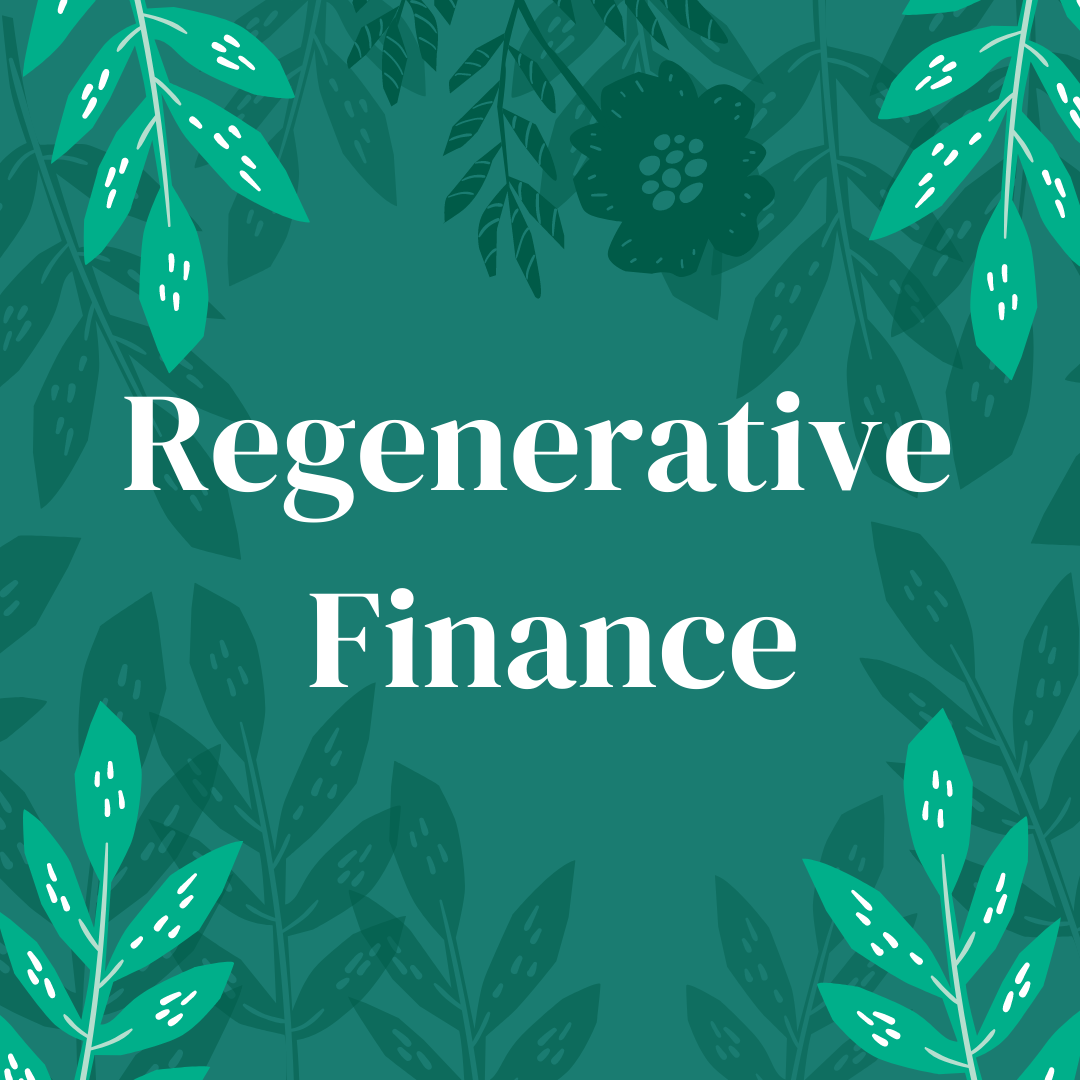Regenerative finance, often referred to as “ReFi,” is a concept that combines principles of regenerative economics and sustainable finance to transform the financial system towards more equitable, resilient, and environmentally sustainable outcomes. It seeks to address the shortcomings of traditional finance, which often prioritizes short-term profit maximization at the expense of social and ecological well-being.
At its core, regenerative finance aims to align financial activities with the principles of regeneration, which include restoring ecosystems, promoting social justice, fostering community resilience, and creating long-term value. It seeks to shift the focus from extractive practices that deplete natural resources and exploit communities to investments that generate positive social and environmental impacts.

Key principles and strategies associated with regenerative finance include:
- Place-based investing: Prioritizing investments in local communities to support economic development, job creation, and the overall well-being of people in specific geographic areas.
- Impact investing: Investing in projects and businesses that have a positive social and environmental impact alongside financial returns. This includes areas like renewable energy, sustainable agriculture, affordable housing, and social enterprises.
- Community finance: Empowering local communities to have control over their financial resources and decision-making processes. This can involve community banks, credit unions, and other cooperative financial institutions.
- Ethical banking and investment: Emphasizing transparency, accountability, and responsible practices in banking and investment activities. This may involve avoiding investments in industries harmful to the environment or human rights and considering the social and environmental impact of investment decisions.
- Circular economy and regenerative agriculture: Promoting economic models that minimize waste, encourage recycling and upcycling, and prioritize regenerative practices in agriculture to restore soil health and biodiversity.
- Socially responsible lending: Ensuring that lending practices consider the social impact of investments, such as providing fair loans to underserved communities or supporting projects with positive social outcomes.
- Financial inclusion: Working towards providing equitable access to financial services and products for marginalized communities, addressing systemic barriers that prevent their participation in the financial system.
The concept of regenerative finance recognizes the interdependence of social, economic, and ecological systems and aims to redirect financial resources towards activities that foster regeneration and sustainability. It seeks to transform the financial sector into a force for positive change, aligning investments and capital allocation with the well-being of people and the planet.
Buy Crypto NowHow Is ReFi Connected To DeFi
Regenerative finance (ReFi) and decentralized finance (DeFi) are two distinct concepts, but they can overlap and intersect in certain areas. While ReFi focuses on transforming the financial system towards regenerative and sustainable outcomes, DeFi pertains to the use of blockchain technology and decentralized networks to recreate traditional financial systems without relying on intermediaries.
The connection between ReFi and DeFi lies in their shared goals of promoting transparency, decentralization, and community empowerment in finance. Both concepts aim to challenge the centralized control of traditional financial institutions and enable more inclusive and equitable participation in financial activities. Here are a few ways in which ReFi and DeFi can intersect:
- Democratization of finance: Both ReFi and DeFi strive to democratize access to financial services and products. ReFi aims to empower marginalized communities and promote financial inclusion, while DeFi allows anyone with internet access to participate in various financial activities without the need for intermediaries like banks.
- Impact investment opportunities: DeFi platforms can facilitate impact investing by providing opportunities to support projects and initiatives aligned with regenerative finance principles. Through decentralized lending, crowdfunding, and tokenized assets, investors can direct funds towards projects promoting social and environmental benefits.
- Tokenization of assets: DeFi often involves tokenizing real-world assets, such as real estate or renewable energy projects, to create digital representations on blockchain networks. This process can enable fractional ownership and greater liquidity, making it easier to invest in sustainable and regenerative projects.
- Sustainable finance protocols: DeFi protocols can integrate sustainability-focused features and governance mechanisms that align with regenerative finance principles. For example, protocols can prioritize projects with positive environmental or social impact and allow token holders to vote on funding decisions.
- Transparency and traceability: Both ReFi and DeFi emphasize transparency and traceability in financial transactions. DeFi’s use of blockchain technology enables immutable records and public visibility of transactions, which aligns with the principles of accountability and responsible finance that ReFi promotes.
While there are areas of convergence between ReFi and DeFi, it is important to note that not all DeFi projects or platforms prioritize sustainability or regenerative principles. As with any rapidly evolving space, careful consideration and due diligence are necessary to identify DeFi projects that align with the values and goals of regenerative finance.








